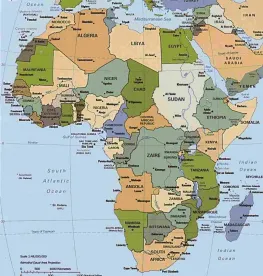The Corruption Perceptions Index (CPI), published annually by Transparency International, scores 177 countries and territories on their perceived level of public sector corruption using a scale from 0 (highly corrupt) to 100 (very clean). This highly-respected annual perception ranking draws its findings from more than a dozen sources, including surveys and data sets from the World Bank, the World Economic Forum, the World Justice Project, the Economist Intelligence Unit, and the Africa Development Bank. The 2013 CPI, published on December 3, details the score and the ranking of each of the 177 countries and territories, and can be accessed at: http://cpi.transparency.org/cpi2013.
For companies seeking to enter the Sub-Saharan Africa (SSA) market or those that are already doing business in SSA, this year’s CPI underscores that the most durable and successful investment strategies going forward will be those that build in meaningful anti-corruption compliance programs. For governments in the region as well, the CPI sends a similar message: taking a stand against graft, insisting that private sector partners do the same, and holding public and private wrongdoers accountable are the surest steps toward building confidence in tomorrow’s investors.
The following are among the more interesting insights from this year’s CPI ratings for SSA nations. Most of our analysis focuses on the 25 countries in SSA with an annual GDP exceeding $10 billion (US) (as reported by current International Monetary Fund statistics).
-
For the 16th year in a row, Botswana was the highest ranked SSA country and indeed, as the 30th best CPI score worldwide, once again placed far higher than any other country on the continent.
-
Five of the SSA’s 25 largest economies improved their score this year: Angola, Democratic Republic of Congo (DRC), Ghana, and Zambia each rose a single point; and Senegal’s score increased a full five points (from 36 to 41), leading to a remarkable improvement of seventeen places in the world rankings (from 94th to 77th place out of the 177 countries surveyed globally).
-
Senegal jumped further in the rankings than all but two countries in the world (Nepal and Laos). Part of the Senegal success story can be attributed to the new Prime Minister, Aminata Touré, who was appointed in September and who brings a reputation as one of the country's strongest corruption fighters. In her prior role as Justice Minister, Prime Minister Touré led extensive anti-corruption campaigns, prosecuting many government officials accused of corruption, including a former president’s son. And in October, Senegal became an Extractive Industries Transparency Initiative (EITI) candidate, committing to public disclosure of all financial payments from the mining, gas and oil industries and civil monitoring of the increased transparency in the extractives sector.
-
As investment surges in the neighboring economies of Angola and DRC – both countries approached double-digit growth last year and have continued that pace in 2013 – there is also room for cautious optimism that these nations are heading in the right direction in the fight against corruption. Each country, however, faces its own set of entrenched challenges and only comprehensive and sustained anti-corruption efforts will lift these and other SSA countries to significantly higher levels of investor confidence.
-
Despite the gains made by some in the CPI, a less favorable overall regional pattern emerges in this year’s numbers. For the entire SSA (48 countries under the CPI model), the average CPI score remained unchanged at 33. And the 25 highest-GDP countries in the region saw their average CPI score go down slightly, from 33 to 32 points. While prior years of improvement in these metrics show incremental progress and the basic goodwill of certain governments in the region, this year’s SSA rankings, on the whole, show that public officials and private investors alike must undertake constant and vigorous efforts to lessen corruption.
-
SSA countries scoring 50 or higher this year are: Botswana (64), Cape Verde (58), Seychelles (54), Rwanda (53), and Mauritius (52). 90% of all the countries in SSA, however, scored less than 50 points.
-
In South Africa and Nigeria, SSA’s largest economies, the CPI finds the public corruption climate worse this year than last. South Africa’s score dropped from 43 to 42 and Nigeria’s from 27 to 25.
-
This is the third year in a row that South Africa has lost ground in its CPI score, its global ranking sliding downward from 54th place in 2010 to 72nd in this year’s rankings. This trend comes at a time of mounting corruption allegations involving the President, controversies that may continue to fester when the country’s Public Protector issues a series of potentially explosive investigative reports, which is expected to occur in the near future.



 />i
/>i

